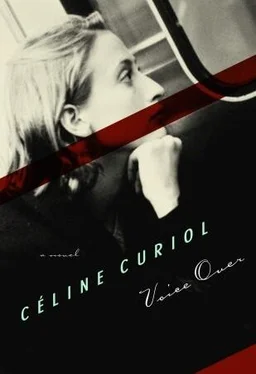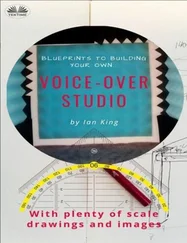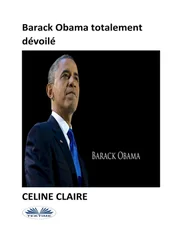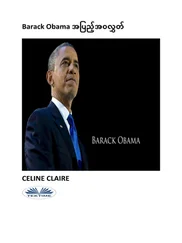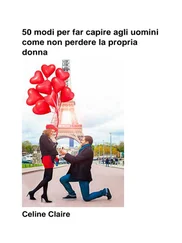Celine Curiol - Voice Over
Здесь есть возможность читать онлайн «Celine Curiol - Voice Over» весь текст электронной книги совершенно бесплатно (целиком полную версию без сокращений). В некоторых случаях можно слушать аудио, скачать через торрент в формате fb2 и присутствует краткое содержание. Год выпуска: 2008, Издательство: Seven Stories Press, Жанр: Современная проза, на английском языке. Описание произведения, (предисловие) а так же отзывы посетителей доступны на портале библиотеки ЛибКат.
- Название:Voice Over
- Автор:
- Издательство:Seven Stories Press
- Жанр:
- Год:2008
- ISBN:нет данных
- Рейтинг книги:5 / 5. Голосов: 1
-
Избранное:Добавить в избранное
- Отзывы:
-
Ваша оценка:
- 100
- 1
- 2
- 3
- 4
- 5
Voice Over: краткое содержание, описание и аннотация
Предлагаем к чтению аннотацию, описание, краткое содержание или предисловие (зависит от того, что написал сам автор книги «Voice Over»). Если вы не нашли необходимую информацию о книге — напишите в комментариях, мы постараемся отыскать её.
Voice Over — читать онлайн бесплатно полную книгу (весь текст) целиком
Ниже представлен текст книги, разбитый по страницам. Система сохранения места последней прочитанной страницы, позволяет с удобством читать онлайн бесплатно книгу «Voice Over», без необходимости каждый раз заново искать на чём Вы остановились. Поставьте закладку, и сможете в любой момент перейти на страницу, на которой закончили чтение.
Интервал:
Закладка:
The bridge they take stretches across a wide river. Along its banks, lights from buildings of every kind, glass towers, domes, stone façades, historical moments set in the dominant materials of their days. She has never seen such a jumble of heights and styles. She never would have guessed that London looked like this. After the bridge, she closed her eyes. She doesn’t know where this man is taking her; she has entrusted herself to him, has given him the task of deciding what her next stop will be. If he pulls over and orders her to get out, she’ll do it because she will have nothing to say to him, no recourse to language to defend herself. She can gesticulate and utter sounds, but she will never convince him of anything by the precision and sharpness of her words. She hasn’t felt so vulnerable in a long time.
The taxi has pulled up outside a building with a white façade, its front entrance flanked by two columns. On a small metal plaque on one of them she reads Beaumont House. She is ready to get out when the driver cuts her short. He says only one word, money. She understands, but she realizes to her horror that she has no money on her, at least not the right sort. Nevertheless, she takes her purse from her bag and from her purse a 20-euro banknote, which she holds out to the driver as innocently as she can. He shakes his head. She pretends not to understand. Pounds, not euros, pounds, not euros, the man says, hammering out his words, completely exasperated. Her head is going to explode. She so wishes he were with her; he could explain the problem to this idiot. She would like to sleep and forget everything. Her eyes close, her body topples sideways, and she feels the cold leather of the seat pressing against her cheek. To stay there, stretched out for ever, rocked by the motion of the taxi taking her through London for all eternity. The door by her head has been flung open, a chill draught tickles the roots of her hair. The driver bombards her with words, demented, meaningless words, and drags her out of the car. She is standing on the pavement, her sports bag and handbag at her feet. The taxi has disappeared.
She has to ring to be let in. When she hears the buzzing in the lock, she pushes the door. A voice calls out, she follows it. She enters a small lounge furnished with two floral-patterned armchairs and a vending machine. No one. Jutting from a wall, she spots a small wooden counter with someone sitting behind it, a thinnish woman with short, sad hair, and a pair of glasses perched on the end of her nose. The woman is hunched over a magazine and fiddling with a bunch of keys. Behind her is a room filled with two paper-strewn desks. As she goes over, the woman gives her an odd sort of elongated smile before she starts to emit, as if in a nightmare, monstrous, incomprehensible words. Ai-don-un-deur-stin-de. The woman appears to grasp the message, holds up an index finger with a pointed nail and raises her eyebrows questioningly. She responds by tucking in her thumb and showing her four other fingers. She’ll be staying here four nights. The woman goes to rummage in a drawer and comes back to show her a bank card. She takes hers out of her purse and hands it over.
Flesh-toned tights and grey mules precede her up the stairs, which groan beneath a thick layer of carpeting. At the top, the woman opens a door: a tiny room just large enough for a toilet. They take a second, narrower staircase that leads straight up to the first floor. They reach a landing where there is barely enough space for the two of them. There are three doors, one of which is the door to her room. The woman pushes the light switch, motions her inside, says a few words with her stiff smile, and withdraws after placing the keys on the night table. She hears the door close, the woman’s faint cough, nothing. Her first silence in the weak glow of the ceiling light. For a moment she remains where she is standing, looking around the characterless room, which doesn’t have a single redeeming feature. Walls that are too bare, a ceiling that is too high, robbing the enclosed space of any sense of protection, a yellowish wardrobe and desk, which have been touched by too many hands but have never belonged to anyone. In one corner is a dismal sink; on the other side, an ugly and cumbersome plastic shower unit. And floating in the midst of it all, the mingled odors of a cleaning product, the starch from the sheets, stagnant water, enclosed air. First, open the window — or rather, in this case, pull up the window. As she leans over the railing, she sees that the hotel looks onto a small park. The fragrant humus is a relief, an olfactory balm, and for several minutes all she wants is to breath in its smell.
She opens the wardrobe doors, the desk drawers, all of them sadly empty, all waiting to be filled to give the occupant an impression of being at home. If he had been there, she would have removed her few things from the sports bag for the sheer pleasure of storing them next to his. Alone, there’s no point. The television set is shut away in a special cabinet opposite the bed. She turns it on, flicks through the channels with the remote control: an English version of the same cathode-TV mush. She has no desire to know what is happening in the immense elsewhere, the opinions of strangers, the dramas of invented characters. In any case, she doesn’t understand a thing. She switches off, the screen swallows back its images, the deluge of aural soup comes to an end. Barefoot on the bed, curled up in a fetal position, she looks for a way to stop the current of speculation that keeps bringing her back to the same question. Why didn’t they find each other? She has two answers and can’t decide between them: an unfortunate cluster of circumstances or the result of an intentional act. She swings from one to the other, going back and forth as monotonously as the pendulum of a clock. Unlucky, cursed, predestined, irresponsible, she tries out these adjectives on herself in an attempt to explain her role in what happened. She has missed her entrance cue, the play will go on without her, she is standing in the wings, flabbergasted that she has failed at the very moment when she most needed to prove her competence. There ought to be a special probe to inspect the inside of her head, that undifferentiated, infinite space that sits miraculously within the confines of her skull. She isn’t sure, but there might be something like an immense clod of dust jamming up a tiny gear. Something not quite right, as they say. She thinks she ought to be thinking about something else, but in thinking this she can’t help thinking about the matter she is thinking about. Try to get some rest. She slips a pillow under her head, a hand under the pillow. Find the best position for sleep. Images march through her mind; above all she must not focus on them. She hears the muffled hum of a car engine in the distance, she’s almost there, she feels her consciousness melting away. But she has to re-open her eyes, brought back to reality by a noise that wasn’t there before, a breathing, a panting, on the other side of the wall. And the more she concentrates, the more she hears it, rhythmical, provocative. Two people are getting it on in the next room. She doesn’t want to know, she doesn’t want to listen, she doesn’t want to hear love, she doesn’t want to know that it exists, she wants to be left alone. She could, but doesn’t dare bang on the wall. Instead, she resigns herself to staying stretched out on the bed, staring up at the ceiling light that undulates through her tears, imagining that dozens of tiny elves have tied her body to the mattress.
She wakes up. The light from a streetlamp is shining on the ceiling of the room, now plunged into darkness. She doesn’t remember switching off the light. Her stomach gurgles. She thinks she hears the sound of a key in a lock.
Читать дальшеИнтервал:
Закладка:
Похожие книги на «Voice Over»
Представляем Вашему вниманию похожие книги на «Voice Over» списком для выбора. Мы отобрали схожую по названию и смыслу литературу в надежде предоставить читателям больше вариантов отыскать новые, интересные, ещё непрочитанные произведения.
Обсуждение, отзывы о книге «Voice Over» и просто собственные мнения читателей. Оставьте ваши комментарии, напишите, что Вы думаете о произведении, его смысле или главных героях. Укажите что конкретно понравилось, а что нет, и почему Вы так считаете.
